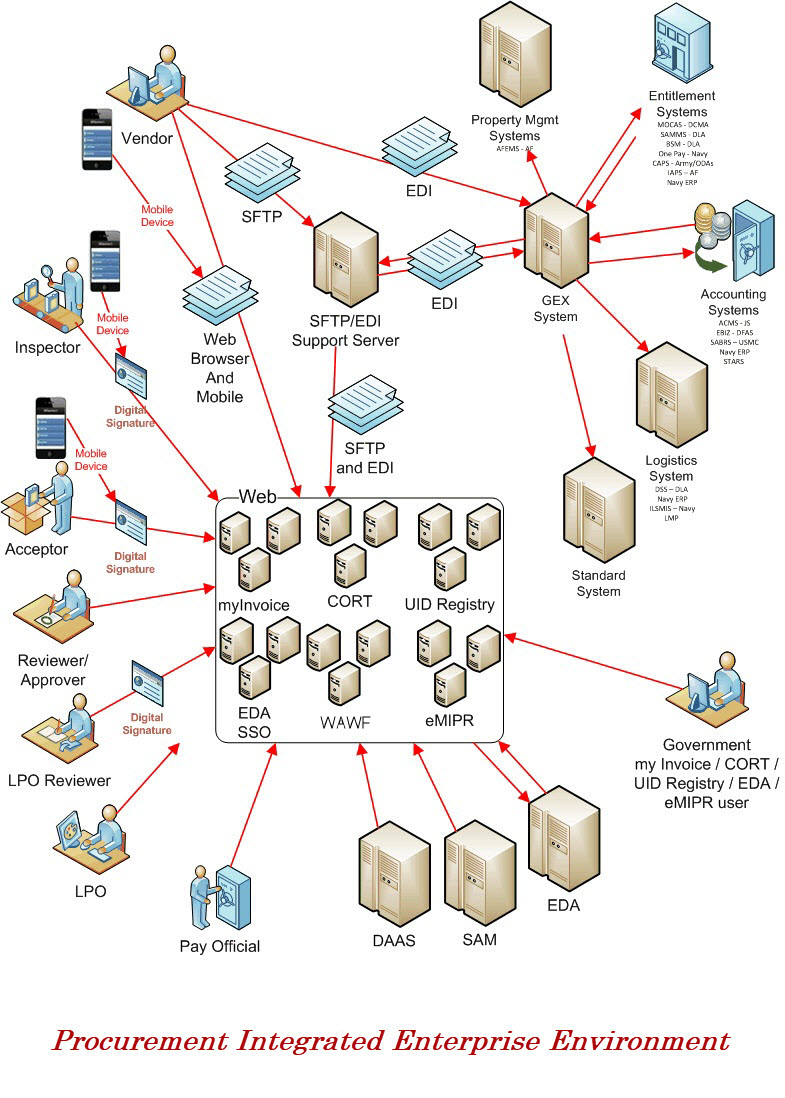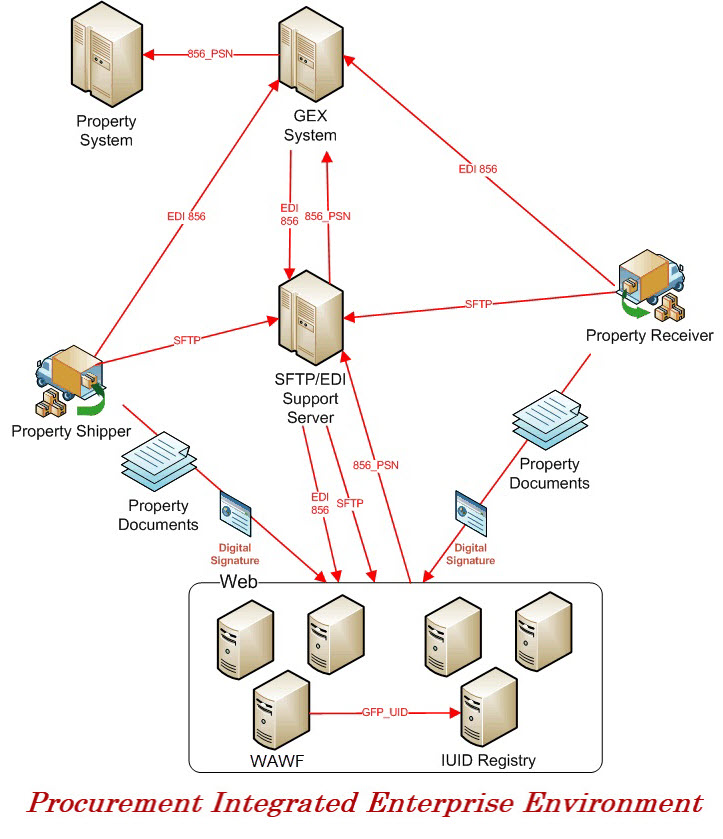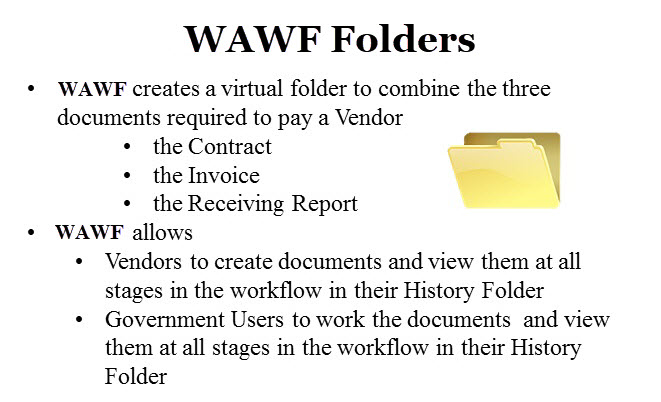1. Background
Traditionally, the Department of Defense (DoD) acquisition process has been paper-based, labor intensive, and heavily dependent upon manual and repetitive data inputs from multiple functional communities. The DoD Paperless Contracting initiative was created in response to the DoD Comptroller's Management Reform Memorandum #2 of 21 May 1997 -- Moving to a Paper-free Contracting Process. The Department of Defense (DoD) Wide Area Workflow (WAWF) began as a Paperless Contracting prototype application to eliminate paper from the Receipt/Acceptance and Invoice/Payment process of the DoD contracting life cycle. It became operational in FY99.
Return to the TOP of the page.
2. What Is DoD WAWF
Wide Area Workflow (WAWF) is a secure Web-based system for electronic invoicing, receipt and acceptance. See the Figure below. WAWF creates a virtual folder to combine the three documents required to pay a Vendor - the Contract, the Invoice, and the Receiving Report. The WAWF application enables electronic form submission of Invoices, government inspection, and acceptance documents in order to support DoD's goal of moving to a paperless acquisition process. It provides the technology for government contractors and authorized DoD personnel to generate, capture, and process receipt and payment-related documentation, via interactive Web-based applications. Authorized DoD users are notified of pending actions by e-mail and are presented with a collection of documents required to process the contracting or financial action. It uses Public Key Infrastructure (PKI) to electronically bind the digital signature to provide non-refutable proof that the user (electronically) signed the document with the contents. More importantly, WAWF helps to mitigate interest penalty payments due to lost or misplaced documents and highlights Vendor offered discounts so that the DoD benefits on both fronts, in addition to streamlining the whole process from weeks to days or minutes. Benefits include online access and full spectrum view of document status, minimized re-keying and improving data accuracy, eliminating unmatched disbursements and making all documentation required for payment easily accessible. WAWF is the system that allows DoD to reach its e-invoicing goals and reduce interest penalties due to lost or misplaced documents.

The WAWF Receipts and Acceptance graphic provides a depiction of the general WAWF functionality. It portrays different ways Vendors interact with WAWF via Web, FTP, or EDI (all EDI transactions are done through GEX - Global Exchange Services). It also shows how government officials including Inspector, Acceptor, Reviewer, Approver, LPO Reviewer, LPO, and Pay Offical interact with WAWF. In addition, it shows the interactions between WAWF and SAM (System for Award Management), DAASC, EDA, Accounting Systems, Logistic Systems, UID Registry, Property System, and the Entitlement Systems.
NOTE:
-
SAM (System for Award Management) - CAGE Code information is pulled from here.
-
DAASC (Defense Automatic Addressing System Center) - DoDAAC information is pulled from here.
-
EDA (Electronic Data Access) - contract information and CLIN information is pulled from here.
-
GEX (Global Exchange Services) - converts Vendor EDI format to a WAWF User Defined Format (UDF).
WAWF also provides the capability to electronically capture and submit information in support of the shipment and the receipt of Government Furnished Property (GFP) by the Department of Defense (DoD) and Vendor activities. This functionality provides all requiring activities, property managers, financial managers, and contractors the capability to access up-to-date information, on a need-to-know basis.

The WAWF Property graphic provides a depiction of the general WAWF Property functionality. It portrays different ways Property Shippers and Property Receivers interact with WAWF via FTP, web, or EDI (all EDI transactions are done through GEX - Global Exchange Services). In addition, it shows the interactions between WAWF and the UID Registry and Property System.
Return to the TOP of the page.
3. Who Are WAWF Customers
Specific DoD components and other government offices using DoD WAWF include:
-
Air Force (USAF)
-
Army (USA)
-
Defense Finance and Accounting Service (DFAS)
-
Defense Information Systems Agency (DISA)
-
Defense Contract Audit Agency (DCAA)
-
Defense Contract Management Agency (DCMA)
-
Defense Logistics Agency (DLA)
-
Marine Corps (USMC)
-
Navy (USN)
-
DoD Vendors
-
Other Defense Agencies (ODAs)
Return to the TOP of the page.
4. WAWF Application Benefits
-
Elimination Of Paper-Based Support Functions: Labor savings are realized by eliminating manual entry of data across programs. From a management and cost savings standpoint, the implementation of WAWF will eliminate numerous support functions required for the current paper-based process. With the electronic capture, storage, and retrieval of required documents, the supporting infrastructure that includes mail, file, and copy rooms and their associated personnel, no longer need to be maintained.
-
Global Accessibility: Multiple users will be able to globally access documents, which will streamline processing, reduce the need for re-typing, improve accuracy, and provide real-time processing and access to document status. WAWF users will be able to research discrepancies, history, or status related to past payment, shipment, or invoices, without having to involve individuals from other organizations within the process.
-
Eliminates Lost Or Misplaced Documents: All documents are stored in one place that is accessible over the Web. A DoD Vendor is able to submit his/her Invoices electronically, and access contract payment records and status. Lead-time from mail transit of documents will be eliminated. It increases cost efficiency (e.g. cheaper to move/store "electrons" than "paper").
-
Accuracy Of Documents: Current problems such as unmatched disbursements, duplicate payments, and payment delays can be alleviated using WAWF.
-
Secure & Auditable Transactions: Access to appropriate functions and documents will be controlled through the user registration process. In addition, Public Key Infrastructure (PKI) certificates will be used to verify user identification, and to digitally sign documents when required.
-
Enables DoD To Take Maximum Benefit Of Discounts: Government personnel can maximize Vendor-offered discounts because Wide Area Workflow highlights those documents first. WAWF improves a Vendor's ability to get paid on time since the documents go through extensive edit checking up front. Any problems with the submitted documents are immediately flagged to the Vendor for correction.
-
Enables Timely & Accurate Payments: DoD Vendors have experienced tremendous benefits by using WAWF. WAWF is capable of taking in EDI X12 files as well as FTP batch files. Vendors who are able to electronically connect, system-to-system, are seeing a decrease in the time it takes to generate a document and get it into government hands for acceptance. What normally took 10 days can now be accomplished in 1 day, if not minutes.
-
Decreases Interest Penalties: Since WAWF decreases processing time by several orders of magnitude, the system will reduce greatly the number of Prompt Payment Act (PPA) violations.
Return to the TOP of the page.
5. Document Types In WAWF
-
Receiving Report (RR)
-
Reparables Receiving Report (RRR)
-
Purchase Card Receiving Report
-
Micro-Purchase Card Receiving Report
-
Energy Receiving Report
-
Invoice
-
Credit Invoice
-
Energy Invoice
-
Invoice Fast Pay
-
Invoice as 2-in-1 (Services Only) (2n1)
-
Invoice and Receiving Report (COMBO)
-
Invoice and Reparables Receiving Report (RCOMBO)
-
Energy Invoice and Energy Receiving Report (ECOMBO)
-
Construction Payment Invoice (CICON)
-
Navy Construction Payment Invoice (NAVCON)
-
Navy Ship Building Invoice (SUPSHIP)
-
TELCOM Invoice (Summary & Detail)
-
Commercial Item Financing (CIF)
-
Performance Based Payment (PBP)
-
Progress Payment (PPR)
-
Cost Voucher
-
Cost Voucher - Shipbuilding
-
Property Transfer Document
-
Miscellaneous Pay Document (Misc. Pay)
-
Grant Voucher
-
Non Procurement Instruments (NPI) Voucher (Old Grant Document with line items)
Return to the TOP of the page.
6. Roles In WAWF
-
Adminstration Roles in WAWF:
-
Group Administrator (GAM)
-
Help Administrator (HAM)
-
System Administrator (SAM)
-
Program Management Office (PMO)
-
Auditor
-
Functional Auditor
Receipts and Acceptance Roles in WAWF:
-
Initiators **CAGE Code controlled by SAM (System for Award Management)**:
-
Vendor
-
Vendor View Only
-
Vendor Ship To View Only
-
Government Users **DoDAACs maintained by DAAS**:
-
Misc. Pay Initiator
-
Inspector
-
Inspector View Only
-
Field Inspector
-
Field Inspector View Only
-
Government Ship To View Only
-
Acceptor
-
Acceptor View Only
-
Cost Voucher Approver
-
Cost Voucher Approver View Only
-
Cost Voucher Reviewer
-
Cost Voucher Administrator
-
Grant Approver
-
Grant Approver View Only
-
Local Processing Office (LPO)
-
Local Processing Office View Only
-
Local Processing Reviewer
-
Pay Official
-
Pay Official View Only
-
Admin By View Only
-
Issue By View Only
-
Other View Only
-
Note for View Only: Responsible for oversight of workers or have a need to view documents outside the workflow process.
Property Roles in WAWF:
-
Contractor Users **CAGE Code controlled by SAM (System for Award Management)**:
-
Contractor Contract Administrator View Only
-
Contractor Program Manager View Only
-
Contractor Property Manager
-
Contractor Property Receiver
-
Contractor Property Receiver View Only
-
Contractor Property Ship From View Only
-
Contractor Property Ship To View Only
-
Contractor Property Shipper
-
Contractor Property Shipper View Only
-
Government Users **DoDAACs maintained by DAAS**:
-
Government Program Manager View Only
-
Government Property Administrator View Only
-
Government Property Receiver
-
Government Property Receiver View Only
-
Government Property Ship From View Only
-
Government Property Ship To View Only
-
Government Property Shipper
-
Government Property Shipper View Only
-
Other Property Users **DoDAACs maintained by DAAS**:
-
Property ACO View Only
-
Property PCO View Only
-
Note for View Only: Responsible for oversight of workers or have a need to view documents outside the workflow process.
Return to the TOP of the page.
7. Folders In WAWF

The graphic provides a depiction of the general WAWF Folder functionality. It portrays the 3 folders required to pay a Vendor, the Contract, the Invoice, and the Receiving Report. It also explains that WAWF allows Vendors to create and view documents at all stages in the workflow, using their History Folder. It also explains that WAWF Government Users are allowed to work and view the documents at all stages in the workflow, using their History Folder.
a. Vendors
Vendors can submit documents electronically using one of four methods to submit data into WAWF:
- Interactive Web Application
- Electronic Data Interchange (EDI)
- Secure File Transfer Protocol (SFTP)

The graphic provides a depiction of the general WAWF Vendor Document Submission functionality. It portrays a Vendor submitting documents using the Web, SFTP, and EDI (all EDI transactions are done through GEX - Global Exchange Services). All documents submitted via SFTP are placed on the WAWF EDI/FTP Support Server. All EDI documents being received from GEX are placed on the WAWF EDI/FTP Support Server. All 4 ways interface with EDA to pre-populate contract data from EDA. Batch jobs are run on the Support server to place the documents in the WAWF database so they can be worked in the WAWF application.
These choices do not result in significant cost or require changes to existing processes. 5.3. Vendors who submit many documents, or have many Line Items on each document, should use SFTP or EDI to submit data into WAWF. Vendors already using EDI will most likely prefer to use EDI with WAWF. SFTP would be less expensive to implement than EDI for new users. After a Vendor uploads a file to the WAWF system using SFTP/EDI, a system-generated e-mail message will notify him/her of any accepted transactions, accepted transactions with modified data, or rejected transactions.
WAWF's interactive Web-application has a session time-out feature. This means it is only appropriate for a Vendor who can enter and submit his/her documents in a short amount of time.
Additionally, the Vendor will receive system-generated e-mail advising him/her of action taken by the Government Officials. If a document is rejected, the Vendor will have the capability to correct the data and resubmit. Thus, only the individual data elements need to be corrected as opposed to re-typing the entire document. Finally, the Vendor will be able to view previously submitted documents and determine the current status, review actions taken by Government officials (to include access to the name, e-mail and telephone numbers), and as appropriate, initiate follow-on actions.
b. Government Officials
The online ability to review documents and compare products/services to the contract terms will assist an Official in performing his/her job. The ability to electronically reject improper documents for modification will also assist these offices in their reviews. Finally, the capability to electronically document inspection and/or acceptance, etc., and digitally sign the information will ensure prompt presentation of the required data to the payment office.
A government official can perform many processes in WAWF. Depending on their WAWF role, he/she can:
-
Inspect documents
-
Accept documents
-
Reject documents
-
Approve documents
-
Review documents
-
Certify documents
-
Process documents
-
Save documents
-
Place documents on hold
-
View documents and check document status
-
Create Receiving Reports (Only Inspector and Acceptor Roles)
-
Correct and resubmit documents he/she has submitted that were rejected*
-
Void documents he/she has submitted
-
Recall documents he/she has submitted or worked, make changes, and resubmit the documents.
-
Make available for Recall documents he/she has worked.
The system-generated e-mail notifications of actions taken will assist all parties in monitoring the process and initiating corrective or follow-up actions.
c. Document Access - View Only
In addition to the user actions outlined above, additional personnel who have a need to view documents can be granted access in a view only mode. Once a document has been captured and processed, it is made available for view only. Access to the documents is limited by the Contractor and Government Entity (CAGE) Code or the Department of Defense Activity Address Code (DoDAAC), to which the individual is responsible for monitoring. A single electronic copy of the document to be accessed by any authorized user with Web capability is available. Authorized government personnel are able to view the Contract, Receiving Reports, and Invoices. Vendors will be able to query and view his/her previously submitted documents.
Return to the TOP of the page.
 7.6.3
7.6.3
 7.6.3
7.6.3
 7.6.3
7.6.3